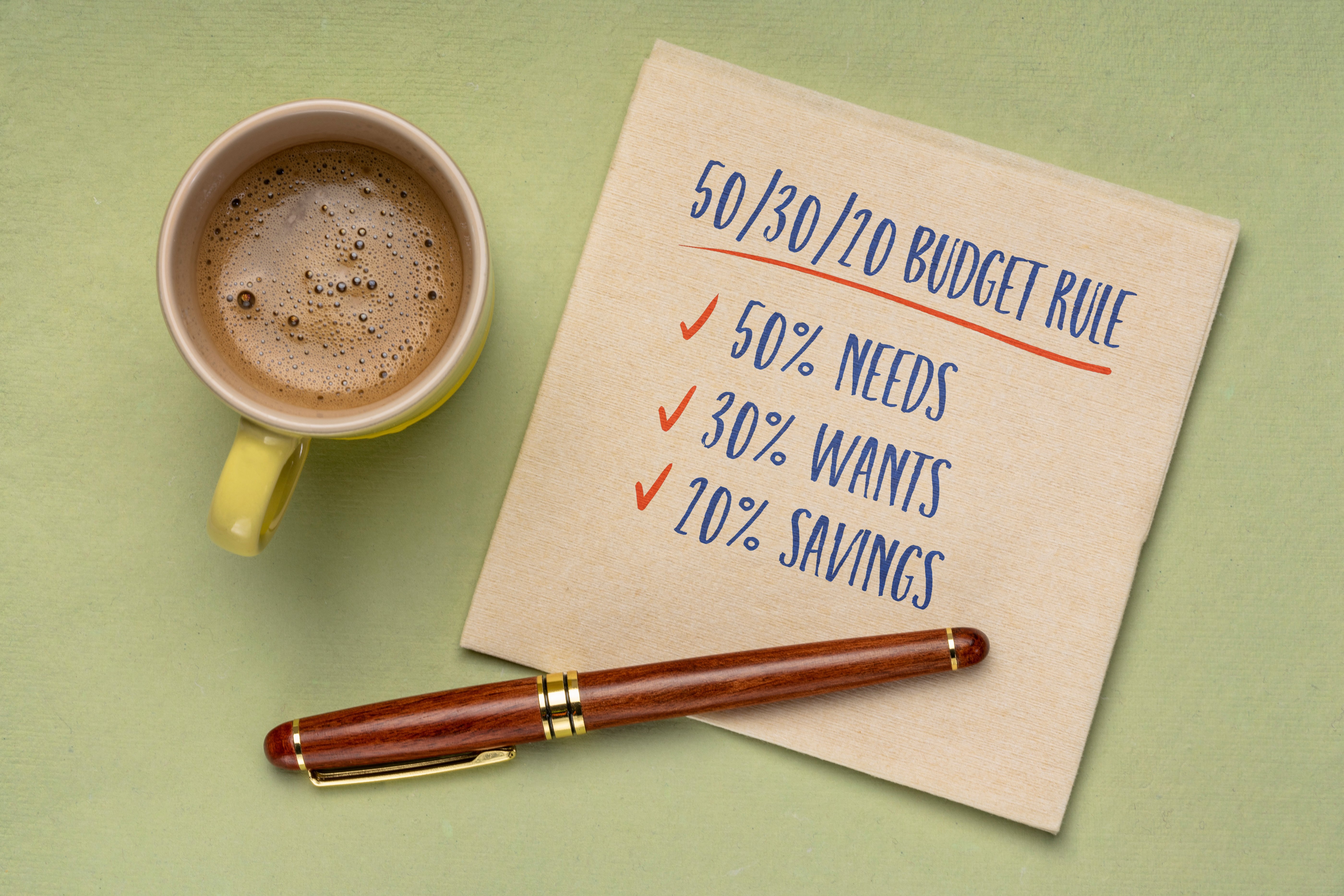6 Gentle Steps to Restore Calm When Your Budget Feels Out of Control
Ever noticed how a shaky budget can feel like trying to navigate a ship through stormy waters? Financial stress affects a staggering 77% of...
Whether you're covering unexpected expenses, making a big purchase, or just need extra cash, our personal loans offer simple, flexible funding tailored to your needs.
Simplify your finances with a loan that combines multiple payments into one. Our consolidation loans help reduce stress and keep your budget on track.
Upgrade your living space with financing designed for renovations, repairs, or remodeling. Our home improvement loans help you enhance your home’s comfort, value, and functionality—on your terms.
Explore expert insights, financial tips, and strategic guidance from the Symple Lending team. Our insights and resource articles are your go-to source for empowering content that helps you make informed decisions on your journey to financial freedom.
Stay up-to-date with the latest press releases, media features, and major announcements from Symple Lending. This section showcases how we're making headlines and driving innovation in the lending industry.
8 min read
Breanne Neely : September 1, 2025

Table of Contents
Ever notice how your car gives warning signals before breaking down? Your financial life works the same way. Before a full-blown financial crisis hits, subtle red flags appear in your daily habits and emotional responses to money matters. Take a moment to reflect on your financial habits and decisions over the past year to identify any patterns or warning signs you may have missed.
Nearly 60% of Americans report feeling anxious about their finances, yet many ignore these early warning signs until they’re facing serious consequences. Recognizing when you need a financial wellness reset isn’t admitting defeat—it’s the first step toward reclaiming control of your financial future.
Financial wellness is more than just having enough money in your bank account—it’s about feeling secure, confident, and in control of your financial future. When you prioritize financial wellness, you’re making a commitment to better understanding your financial decisions, creating a realistic budget, and saving money for both short-term needs and long-term goals.
A financial reset can be the perfect opportunity to pause, reflect, and start fresh. By reassessing your spending habits and opening a dedicated savings account, you set the stage for lasting progress. Building an emergency fund is a crucial part of this process, providing a safety net when life throws you a curveball.
Taking these steps not only reduces financial stress but also helps you create a plan to achieve your dreams—whether that’s buying a home, taking a vacation, or simply having peace of mind. Remember, every dollar you save and every smart financial decision you make brings you closer to a brighter, more secure future.
Before you can move forward with your financial plans, it’s essential to get a clearer picture of where you stand today. Start by gathering all your important financial documents—bank statements, credit card bills, and investment account summaries. Reviewing these records gives you valuable insight into your income, expenses, and savings.
Don’t overlook variable expenses like groceries, entertainment, or those occasional splurges. Tracking every transaction, no matter how small, helps you understand exactly where your money is going. This process is the first step toward creating a personalized financial plan that fits your life.
By taking the time to assess your current financial situation, you’ll be able to spot patterns, identify areas for improvement, and set realistic goals for saving and investing. With this knowledge, you can create a plan that supports your needs today and helps you build a stronger financial future.
When you’re only sending in the minimum amount due on your credit cards or loans each month, you’re stuck in a financial trap. This habit stretches your debt repayment timeline and significantly increases the total interest you’ll pay over time.
This behavior often points to underlying money management issues. Perhaps you’re spending more than you earn or haven’t prioritized debt reduction in your budget.
Consider this: If you’re regularly treating yourself to takeout meals or maintaining multiple streaming subscriptions while only making minimum payments on your credit card, you’re essentially choosing short-term pleasures over long-term financial health.
 A practical solution is creating a structured budget. The 50-30-20 method works well for many people: 50% of your income goes toward necessities, 30% toward things you want, and 20% toward savings and paying down debt. By identifying and cutting unnecessary expenses, you can free up extra money in your budget, which can be used to accelerate debt repayment and break free from the minimum payment cycle. This simple framework can help you make steady progress toward financial stability.
A practical solution is creating a structured budget. The 50-30-20 method works well for many people: 50% of your income goes toward necessities, 30% toward things you want, and 20% toward savings and paying down debt. By identifying and cutting unnecessary expenses, you can free up extra money in your budget, which can be used to accelerate debt repayment and break free from the minimum payment cycle. This simple framework can help you make steady progress toward financial stability.
Having a solid emergency fund isn’t just good financial advice—it’s your safety net when life happens. Without this cushion, you’re vulnerable to job loss, unexpected medical bills, or even something as common as car repairs.
When your emergency savings are nearly depleted, it’s a clear warning sign that your finances need attention. This situation often reflects either ongoing overspending or a lack of planning for inevitable unexpected expenses.
To rebuild your fund, start small but be consistent. Experts recommend saving three to nine months of living expenses in your emergency fund to provide a solid financial cushion. Set up automatic transfers—even $25 a week adds up to $1,300 in a year. Treat these savings like any other bill that must be paid on schedule.
 Consider the real impact: If your refrigerator stops working tomorrow, or you need emergency dental work, how would you pay for it? Without savings, you might resort to high-interest credit cards or loans, potentially creating a stressful financial situation.
Consider the real impact: If your refrigerator stops working tomorrow, or you need emergency dental work, how would you pay for it? Without savings, you might resort to high-interest credit cards or loans, potentially creating a stressful financial situation.
Remember, financial security isn’t about having everything perfect—it’s about having preparations in place when things go wrong.
That knot in your stomach when an unexpected bill arrives isn’t just uncomfortable—it’s a warning sign. Unexpected financial challenges can happen to anyone, making it important to be prepared. Financial uncertainty, especially when you’re unsure if you can cover surprise expenses, creates chronic stress that can affect your work performance and even increase absenteeism.
This anxiety often triggers a harmful cycle: financial stress leads to reactive decisions like impulse purchases or hasty job changes without proper planning, which only creates more financial instability and stress.
To break this pattern, start incorporating irregular expenses into your monthly budget. Set aside small amounts regularly for car repairs, medical costs, or home maintenance before they become emergencies.
 When unexpected bills do arrive, tackle them immediately rather than letting them linger. Prioritize these expenses and adjust your discretionary spending temporarily if needed.
When unexpected bills do arrive, tackle them immediately rather than letting them linger. Prioritize these expenses and adjust your discretionary spending temporarily if needed.
For the emotional side, try brief “rest resets”—short breaks where you step away from stressful financial situations to clear your mind. Even five minutes of focused breathing can improve your decision-making and prevent money-related burnout.
When your daily living costs gradually increase while your paycheck stays the same, you’re headed for trouble. This financial imbalance often happens so subtly you might not notice until you’re already struggling.
Think about those small, everyday decisions: grabbing coffee on the way to work, subscribing to “just one more” streaming service, or ordering takeout when you’re too tired to cook, or making monthly mortgage payments. Individually, these expenses seem minor, but collectively, they can derail your financial wellness.
Start tracking where your money goes using a simple method that works for you—whether that’s a dedicated app, a basic spreadsheet, or even a notebook. Review these records regularly to identify spending patterns and cut back on non-essentials when necessary.
 If expense management alone isn’t enough, it might be time to focus on the income side of the equation. Consider having a conversation about a raise with your employer, picking up extra shifts, or starting a side project that generates additional money to restore your financial stability when facing budget constraints.
If expense management alone isn’t enough, it might be time to focus on the income side of the equation. Consider having a conversation about a raise with your employer, picking up extra shifts, or starting a side project that generates additional money to restore your financial stability when facing budget constraints.
It’s easy to lose track of where your money goes, especially with the convenience of online banking and contactless payments. Mindless spending—those small, unplanned purchases—can quickly add up and derail your financial progress. Whether it’s grabbing an extra coffee, making impulse buys online, or forgetting to cancel unused subscriptions, these habits can eat into your savings without you even realizing it.
An effective strategy is to implement a “cooling-off” period before making non-essential purchases. Give yourself 24 hours to decide if you really need that item or if the money could be better used to boost your emergency fund or savings account. By becoming more intentional with your spending, you’ll find it easier to save money and make progress toward your financial goals.
When your financial goals lack clarity or you’re not making progress toward them, frustration builds and your financial growth stagnates. This common warning sign often leaves you feeling stuck in a financial rut.
People with strong financial wellness typically write down their goals and review them regularly. Try using the S.M.A.R.T. framework to make your objectives specific, measurable, achievable, relevant, and time-bound. For instance, instead of “save more money,” try “save $2,000 for a vacation by December.”
Take time to reconsider what financial success actually means to you. Sometimes, simplifying your financial life can renew your motivation. For example, consolidating multiple debts with a personal loan might give you a clearer path forward with just one monthly payment to track.
 The right tools can make all the difference in your money reset journey. Budgeting apps can provide clarity on your spending patterns, while financial products like debt consolidation options might help streamline your priorities and create momentum toward your goals. Clarifying your goals and streamlining your finances can help you keep moving forward toward financial wellness.
The right tools can make all the difference in your money reset journey. Budgeting apps can provide clarity on your spending patterns, while financial products like debt consolidation options might help streamline your priorities and create momentum toward your goals. Clarifying your goals and streamlining your finances can help you keep moving forward toward financial wellness.
Sometimes, navigating your financial journey requires expert guidance. If you’re facing complex decisions about investment accounts, retirement planning, or tax advice, consulting with a SEC registered investment adviser can provide the clarity and confidence you need. These professionals can help you develop a personalized strategy, taking into account your unique goals, risk tolerance, and current financial situation.
It’s important to remember that while online resources and financial tools are helpful, they can’t replace tailored advice from a qualified expert. A professional can help you review your investment options, understand the impact of interest rates, and ensure your plans align with your long-term objectives. They can also provide legal and tax guidance, helping you avoid costly mistakes and make the most of your money.
Don’t hesitate to reach out for support—whether you’re planning for retirement, managing debt, or simply want a better understanding of your finances. The right advice can make all the difference in achieving financial security and peace of mind.
Achieving financial wellness isn’t just about numbers—it’s also about cultivating a positive and resilient mindset. Setbacks and unexpected expenses are a normal part of life, but how you respond can shape your financial future. Focus on progress, not perfection, and celebrate small wins along the way, like paying off a credit card or reaching a savings milestone.
Stay motivated by regularly reviewing your goals and tracking your achievements. If you encounter obstacles, use them as learning opportunities to adjust your plans and move forward with renewed determination. Surround yourself with supportive resources, whether that’s educational content, financial planning tools, or a trusted adviser.
Remember, maintaining a healthy financial mindset is an ongoing commitment. By staying proactive, flexible, and optimistic, you’ll be better equipped to handle challenges, make smart financial decisions, and build lasting security for yourself and your loved ones.
Recognizing these warning signs in your own financial life isn’t a reason for shame—it’s the first step toward positive change. Take a moment to honestly assess which of these patterns might be affecting your money situation right now.
Financial wellness isn’t about perfection; it’s about awareness and making informed adjustments. The simple act of acknowledging where you need a reset can be incredibly freeing.
Consider what tools might help you breathe easier financially. A personal loan could consolidate high-interest debts into one manageable payment. Automated savings apps might help rebuild your emergency fund without requiring constant willpower. The advantage of using automated savings tools is that features like automatic transfers make saving money easier and more consistent.
Don’t hesitate to seek support through financial counseling services, many of which are available at no cost through credit unions or community organizations. Sometimes an outside perspective provides clarity when you feel stuck.
Remember that financial stability is built through consistent small actions rather than dramatic changes. Every step you take—whether tracking expenses for a week or setting up automatic transfers to savings—moves you closer to the peace of mind that comes with financial wellness.
Financial health, like physical health, requires regular check-ups and occasional course corrections. If you’ve recognized any of these warning signs in your own life, today is the perfect day to begin your reset journey. Remember that financial wellness isn’t about reaching a perfect end state—it’s about creating sustainable habits that grow with you.
Start with just one area that needs attention. Reviewing your financial data—such as expenses, income, and savings trends—can help you make informed decisions as you begin your financial wellness reset. Whether it’s creating a payment plan beyond the minimums or setting up automatic transfers to rebuild your emergency fund, taking that first step breaks the inertia. Your future self will thank you for having the courage to acknowledge these warning signs and take action now.
Disclaimer: The information provided in this blog post is for educational and informational purposes only and should not be considered as financial, legal, investment, or tax advice. Symple Lending is not responsible for any financial outcomes resulting from following the information or ideas shared in this blog. Every individual’s financial situation is unique, and we strongly encourage readers to take their own circumstances into consideration and consult with a qualified financial, legal, tax, and investment advisor before making any financial decisions. Symple Lending does not provide financial, legal, tax, or investment advice.

Ever noticed how a shaky budget can feel like trying to navigate a ship through stormy waters? Financial stress affects a staggering 77% of...

Did you know that the average homebuyer spends less than 10 hours researching their mortgage options, despite it being one of the largest financial...

Did you know the average American juggles between 3-5 monthly bills, with each one carrying its own mental tax beyond the dollars owed? That’s right,...

Did you know the average American juggles between 3-5 monthly bills, with each one carrying its own mental tax beyond the dollars owed? That’s right,...

Ever wondered why some people seem effortlessly in control of their finances while others struggle paycheck to paycheck? The secret might be simpler...

If you’ve ever reached the end of the month wondering how your paycheck disappeared so quickly, you’re not alone. Money management can feel messy,...